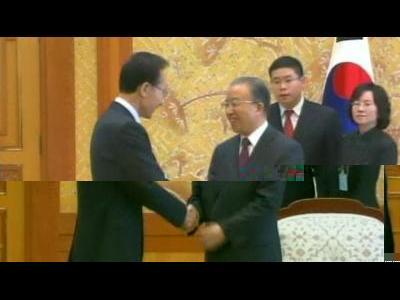YEONPYEONG, South Korea (Reuters) – North Korea has placed surface-to-surface missiles on launch pads in the Yellow Sea, Yonhap news agency said, as the United States and South Korea began military drills and China called for emergency talks.
China made clear that the talks would not amount to a resumption of six-party disarmament discussions which North Korea walked out of two years ago and declared dead. South Korea said it would carefully consider China's suggestion.
South Korean President Lee Myung-bak had told a visiting Chinese delegation that Beijing, North Korea's only major ally which is traditionally reluctant to criticize the reclusive regime, should do more to help.
China, which agreed with South Korea that the situation was "worrisome," suggested the emergency talks for December among North and South Korea, host China, the United States, Japan and Russia. It did not say whether Pyongyang had agreed to join.
Japan was non-committal. "We want to respond cautiously while cooperating closely with South Korea and the United States," Kyodo news agency quoted Deputy Chief Cabinet Secretary Tetsuro Fukuyama as saying.
Beijing has long-standing bonds with Pyongyang, and has sought to shield its small, poor neighbor from a backlash that China fears could draw an even more ferocious reaction from North Korea and dangerously destabilize the region.
Critics in Washington and other capitals say China's approach amounts to coddling a dangerous nuclear-armed state.
Yonhap said North Korea, whose ailing leader, Kim Jong-il, is preparing to hand over the reins of power to hisyoungest son, had moved surface-to-air missiles to frontline areas, days after it shelled Yeonpyeong killing four people. The North's official KCNA news agency warned of retaliatory action if its territory is violated.
South Korea's Defense Ministry told journalists to leave the island on Sunday because the situation was "bad." Many residents evacuated earlier said they did not want to return.
In Seoul, life carried on normally for the city's more than 10 million residents, with downtown shopping districts jammed with people despite the freezing temperatures, and cafes decked with Christmas decorations doing brisk business.
"I am worried, but not that worried that I need to stay at home," said Eunhye Kim, an usher showing people from a packed theater in the capital. "They don't really want to make war ...there's no gain for either side."
PRESSURE ON CHINA
The exercises, in waters far south of the disputed maritime boundary, are being held in the face of misgivings by China and threats of all-out war from North Korea.
The chairman of North Korea's Supreme People's Assembly will visit China from Tuesday, the official Xinhuanews agency said.
China has not taken sides in the conflict and declined to blame North Korea, unlike the United States, for the sinking of a South Korean naval vessel in March.
"We ask that China make a contribution to peace on the Korean peninsula by taking a more fair and responsible position on South-North Korea ties," the South Korean presidential Blue House quoted Lee as telling Dai.
Washington says the drill is intended as a deterrent after the worst assault on South Korea since the end of the Korean War in 1953.
Seoul expects jitters in financial markets to settle in the short term unless North Korea carries out further provocations, Yonhap quoted a senior Finance Ministry official as saying.
The nuclear-powered carrier USS George Washington, which carries 75 warplanes and has a crew of over 6,000, has joined the exercises and will be accompanied by at least four other U.S. warships, an official from U.S. Forces Korea told Reuters.
South Korea has deployed three destroyers, frigates and anti-submarine aircraft, Yonhap reported, adding the exercises were being held far south of the disputed area where the artillery firing took place on Tuesday.
South Korea's marine commander on Saturday vowed "thousand-fold" revenge for the North Korean attack. North Korea said that if there had been civilian deaths, they were "very regrettable," but that South Korea should be blamed for using a human shield.
It also said the United States should be blamed for "orchestrating" the whole sequence of events to justify sending an aircraft carrier to join the maritime maneuvers.
(Additional reporting by Cheon Jong-woo, Jack Kim and Jeremy Laurence in Seoul, Chris Buckley and Sui-Lee Wee in Beijing and Ed Klamann in Tokyo)
(Writing by Nick Macfie; Editing by Andrew Marshall)



Tidak ada komentar:
Posting Komentar